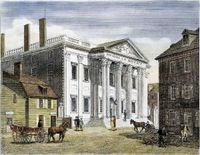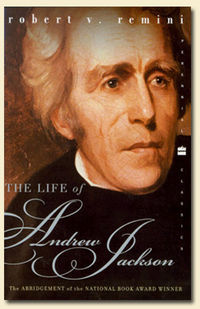
In all the talk over bank bailouts an
obvious and very American solution is being ignored.
The original Bank was proposed in 1791
by Alexander (10-spot) Hamilton.
It fulfilled many roles the Federal Reserve now fills. A second
bank, chartered in 1816, was closed by Andrew Jackson to much
political rejoicing
– and the country promptly fell into a deep Depression.
The purpose of the Third Bank of the
United States would be to re-start the banking system. We could
capitalize it with the current TARP funds and then start making
loans. All kinds of loans, the kinds of credit facilities good
businesses need to keep operating, to make payroll, buy inventory,
all that. And the bank would charge a market rate – maybe just .01%
less to bring business in the door.
To make clear that this bank stands mid-way between government control and Wall Street greed, I suggest we put it where the first two banks were — Philadelphia.
Once the new bank was operating you
could let the existing banks fail. Instead of buying their worst
assets you could buy their best, and add these to the bank,
increasing its value. Later, as normal business began returning, you
could spin out these assets at a substantial profit.
As with the other U.S. Banks, the new
bank would exist for a limited period of time, 20 years, to allow for
an orderly and profitable liquidation. It would not hold tax receipts
– the Federal Reserve would continue to manage the system as a
whole – and the new bank would be regulated by the Fed as well.
As a U.S. Government entity the new
bank could be exceedingly transparent, so citizens could learn how
banking works. It could keep a lid on salaries and still get the best
people, because the best bankers are actually unemployed right now.
(It's the sharpies, shysters, and crooks who are still running the
private businesses.)
As existing big banks go bust the new
bank could take on their assets – the loans – at whatever price
the bank chooses to pay for them. Insured deposits would remain in
the private banking system, so there would be no takeover of that
system by the government.
Politically you could not call the new
bank “socialist.” The U.S. Bank closed before the term was even
coined. The U.S. Bank would do a much better job protecting the TARP
money than any bail-out could – it would practically be a
guaranteed money-spinner.
Now tell me why I'm crazy.










The Third Bank of the United States should not be a member of the Federal Reserve. The Fed is politically independent, the people aren’t considered responsible stewards of the economy. Rather, the bank charter should be so narrow in scope of activity that excutive opportunity for corruption is not likely. Start with home loans of median size/cost.
The Third Bank of the United States should not be a member of the Federal Reserve. The Fed is politically independent, the people aren’t considered responsible stewards of the economy. Rather, the bank charter should be so narrow in scope of activity that excutive opportunity for corruption is not likely. Start with home loans of median size/cost.